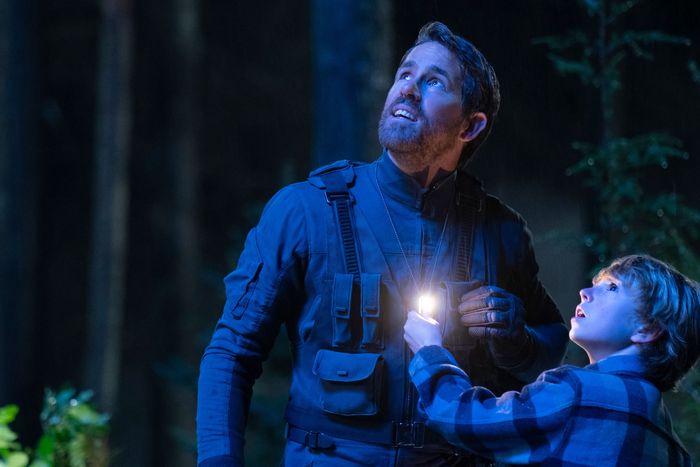
The Adam Project doesn’t feel like a real movie. It feels phony both from the outside — Ryan Reynolds traveling back in time to meet his 12-year-old self and do battle against futuristic soldiers could be something you’d see on a movie poster in a not-too-inventive showbiz satire — and from the inside, too. It’s an assemblage of ideas from other popular films that just hangs there with little cohesion. It’s like watching a movie that hasn’t been made yet.
And the strangest thing is that The Adam Project seems to know this. The great challenge with Reynolds has always been how to handle the fundamental insincerity of his presence. He has a way of making everything he says feel predetermined. That can actually lead to some interesting performances, and he’s at his best in roles that embrace this calculated quality: He made a great con artist/gambler in Mississippi Grind and a convincingly patronizing frat bro in Van Wilder. Last year’s Free Guy wasn’t exactly great, but he was kind of perfect as a NPC, a non-playable character, who attains sentience; that robotic aura of his made sense for someone who existed entirely inside a video game.
Shawn Levy, the director of Free Guy, is also the man behind The Adam Project, and the two films do share an almost psychotic, all-you-can-eat derivativeness. Reynolds plays Adam Reed, whom we first see piloting some kind of futuristic spaceship in the year 2050, while nursing a wound in his stomach, right before he makes a time jump to the year 2022. He lands in the woods outside the home that he lived in as a child with his widowed mother (Jennifer Garner). Twelve-year-old Adam (Walker Scobell) is scrawny and asthmatic, a wise-ass constantly picked on by bullies. But the boy quickly realizes that this wounded, buff, cynical soldier is his future adult self, and before we know it, the two of them are off on the next stage of Adam’s mysterious mission to undo the past.
It’s not actually that mysterious. The time-travel technology of the future was, we learn, invented by Adam’s late scientist father, Louis (Mark Ruffalo), in 2018, in a collaboration with wealthy businesswoman Maya Sorian (Catherine Keener). In 2050, Sorian has somehow used this technology to turn Earth into a hellhole. (We have to take the movie’s word for it — or rather Adam’s, when he notes that The Terminator would be “a good day” in the future. We don’t really see any such thing.) So the two Adams now have to jump back to 2018 and stop their father from turning time travel into a thing. I think. My brain shut off after a certain point.
It’s all quite silly, but at least the latter parts of the film allow us to spend some time with Ruffalo, who brings the kind of emotional openness and engagement that Reynolds refuses to. That is actually an interesting contrast between the two actors, and it could even be an interesting plot point in some future version of this movie that was put together with something resembling care. (Sadly, the great Keener is not as lucky as Ruffalo. She’s thoroughly wasted. In fact, she’s worse than wasted. In some later scenes that present us with an awkwardly de-aged version of her, Keener is actually turned, through the magic of modern motion picture visual-effects technology, into a bad actress.)
Regarding the movie’s premise: You probably have a lot of questions at this point. I assure you that The Adam Project does not answer any of them. It’s a film designed to thumb its nose at geeks who might wonder just what exactly this movie’s conception of time travel entails, but it also isn’t going to satisfy those of us who think films already spend too much time trying to make all their fake science work. This isn’t exactly Claire Denis’s High Life or Andrei Tarkovsky’s Solaris. Shawn Levy isn’t going to counter nerdy obsessives with fuck-you formalism.
No, Levy simply wants to entertain, which is certainly a noble goal. He has paced the film at such breakneck speed that he presumably hopes we’ll be having too much fun to wonder how any of this works. But it’s not just the dorky sci-fi stuff that goes out the window. The emotional logic is discarded as well. When the two Adams meet, the older Adam assures us that the younger Adam is annoying as hell. And yet, the exact opposite seems to be true; the kid seems like a pretty average kid, while grown-up Adam is the irritating smart-ass. Is this intentional? Who knows? Who cares? The movie has lots of ideas, but it doesn’t follow through on any of them. Over and over, it just moves onto the next disjointed plot point. Derivativeness in and of itself isn’t always a problem. Even corporate cynicism isn’t necessarily a problem. But when it’s all handled this shoddily, what comes through is crass, careless opportunism.
More Movie Reviews
- The Accountant 2 Can Not Be Taken Seriously
- Another Simple Favor Is So Fun, Until It Gets So Dumb
- Errol Morris Has Been Sucked Into the Gaping Maw of True Crime


